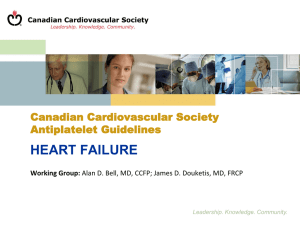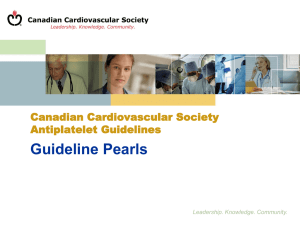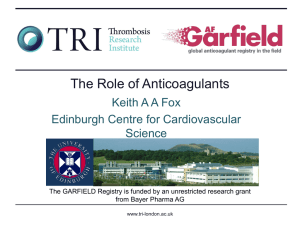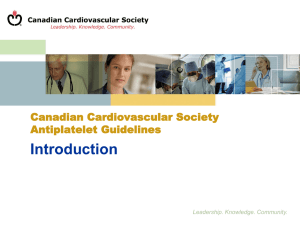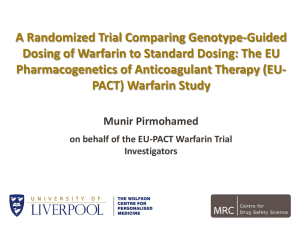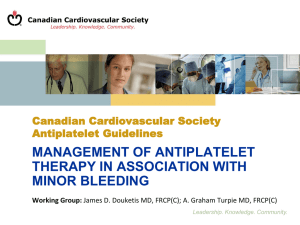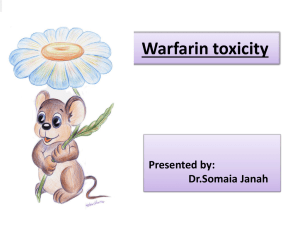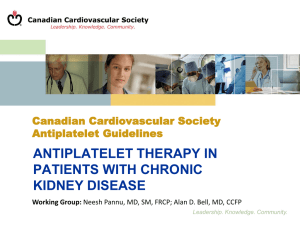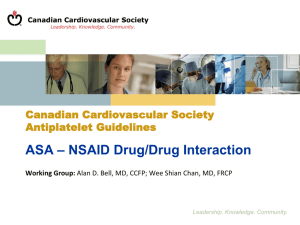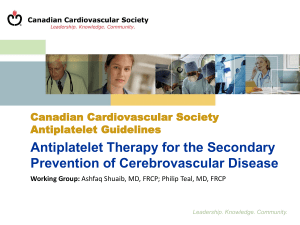CCS Guideline on Antiplatelet Therapy for patients requiring Warfarin
advertisement
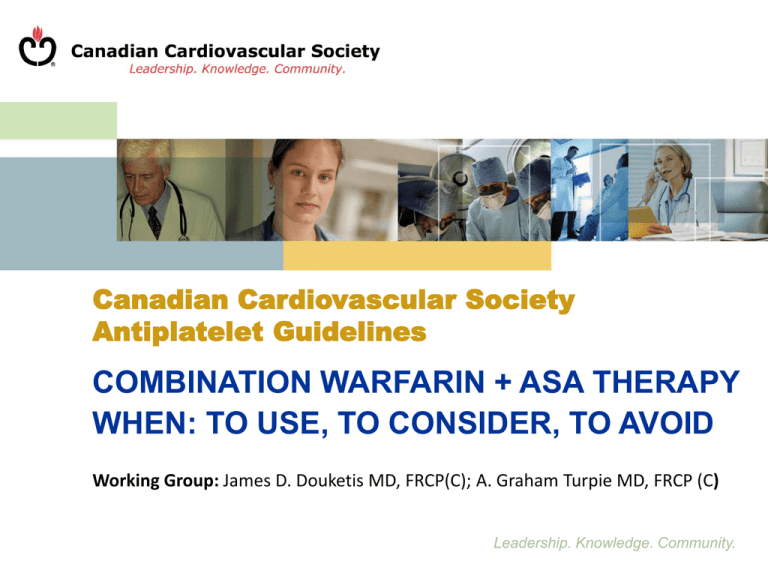
Canadian Cardiovascular Society Antiplatelet Guidelines COMBINATION WARFARIN + ASA THERAPY WHEN: TO USE, TO CONSIDER, TO AVOID Working Group: James D. Douketis MD, FRCP(C); A. Graham Turpie MD, FRCP (C) Leadership. Knowledge. Community. Objectives Interpret the Canadian Cardiovascular Society Guideline recommendations regarding the use of warfarin in combination with antiplatelet agents. Analyze the risk and benefits of combining warfarin with antiplatelet agents. Evaluate the evidence supporting the recommendations regarding the combination of warfarin and antiplatelet agents. © 2011 - TIGC Case study no. 1 71-year old woman with stable CAD is receiving long-term ASA, 81 mg daily, is found to have atrial fibrillation on a routine examination and, over time, is classified as having chronic AF. Comorbidities: hypertension, compensated heart failure, moderate renal insufficiency (CrCl = 48 mL/min) CHADS2 score = 2 (CHA2DS2VASc score = 3) What to do now? © 2011 - TIGC Management question A. Add warfarin, target INR = 2.5 B. Add dabigatran, 150 mg twice-daily C. Add clopidogrel, 75 mg once-daily D. Warfarin alone, target INR = 2.5 E. Dabigatran alone, 150 mg twice-daily © 2011 - TIGC Evidence: Thrombotic/ischemic events Warfarin-ASA vs. Warfarin Absolute risk difference (per yr) Odds ratio (95% CI) Study Type Comparing Warfarin-ASA vs. Warfarin Meta-analysis1 Linked database2 RCT substudy3 Communitybased study4 8.8% vs. 6.3% n/a 1.5% vs. 1.7% 0.3% vs. 0.4% 0.66 (0.52-084) 1.27 (1.14-1.40)¶ n/a 1.48 (0.435.1) 0.99 (0.47-2.07)† 0.69 (0.35-1.36)‡ †Studies of patients with atrial fibrillation ‡Studies of patients with coronary artery disease ¶Ischemic stroke risk © 2011 - TIGC Evidence: Major bleeding events Warfarin-ASA vs. Warfarin Absolute risk difference (NNH) Odds ratio (95% CI) Study Type Comparing Warfarin-ASA vs. Warfarin Meta-analysis1 Linked database2 RCT sub-study3 Communitybased study4 3.8% vs. 2.8% (100) 6.9% vs. 3.9% (33) 3.9% vs. 2.3% (63) 2.0% vs. 0.9% (91) 1.43 (1.00-2.02) 1.83 (1.72-1.96) 1.96 (1.49-2.58) 2.06 (1.01-4.36) © 2011 - TIGC Evidence for therapeutic benefit with combination warfarin-ASA therapy Strong evidence for benefit Weak evidence for benefit mechanical mitral valve chronic AF alone mechanical aortic valve + risk factors for thromboembolism chronic stable CAD chronic AF + chronic stable CAD © 2011 - TIGC What if? Patient develops acute MI after laparoscopic colon resection? Coronary angiography is followed by 4-vessel CABG surgery. 8 © 2011 - TIGC Management question A. Continue warfarin + ASA indefinitely. B. Continue warfarin + ASA for 12 months, afterwards stop ASA. C. Stop warfarin, start ASA + clopidogrel. © 2011 - TIGC Evidence for therapeutic benefit with combination warfarin-ASA therapy Insufficient evidence for therapeutic benefit but reasonable to consider warfarin + ASA: Chronic AF (or prior VTE) + recent coronary artery stent Chronic AF (or prior VTE) + recent CABG Chronic AF (or prior VTE) + new stroke despite therapeutic INR © 2011 - TIGC 11 ® Recommendations In patients with a mechanical heart valve, warfarin (INR: 2-3) + ASA (75-162 mg daily) should be considered, especially for: - any mechanical mitral valve - older (caged-ball, monoleaflet) mechanical aortic valve (Class IIa, Level A). In patients with an indication for long-term warfarin who develop an ACS that is treated with medical therapy alone, warfarin (INR: 2-3) + ASA (75-162 mg daily) is reasonable for up to 12 weeks, at which time ASA may be withdrawn if there are no further cardiac events (Class IIb, Level C). 12 ® Antiplatelet therapy in patients requiring warfarin © 2011 - TIGC
